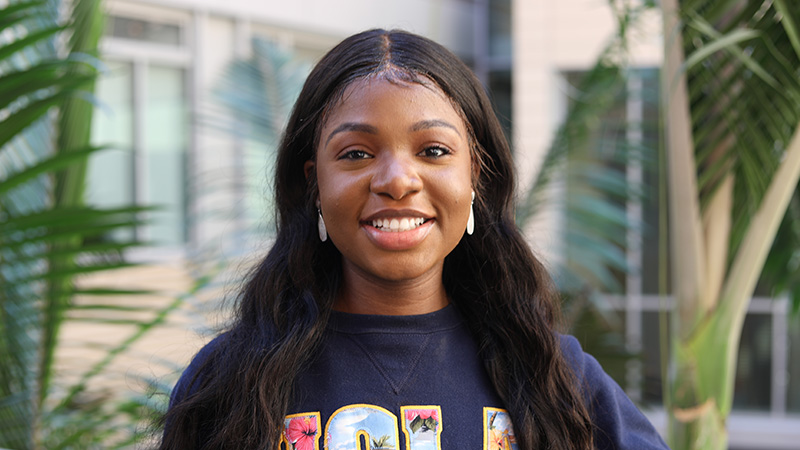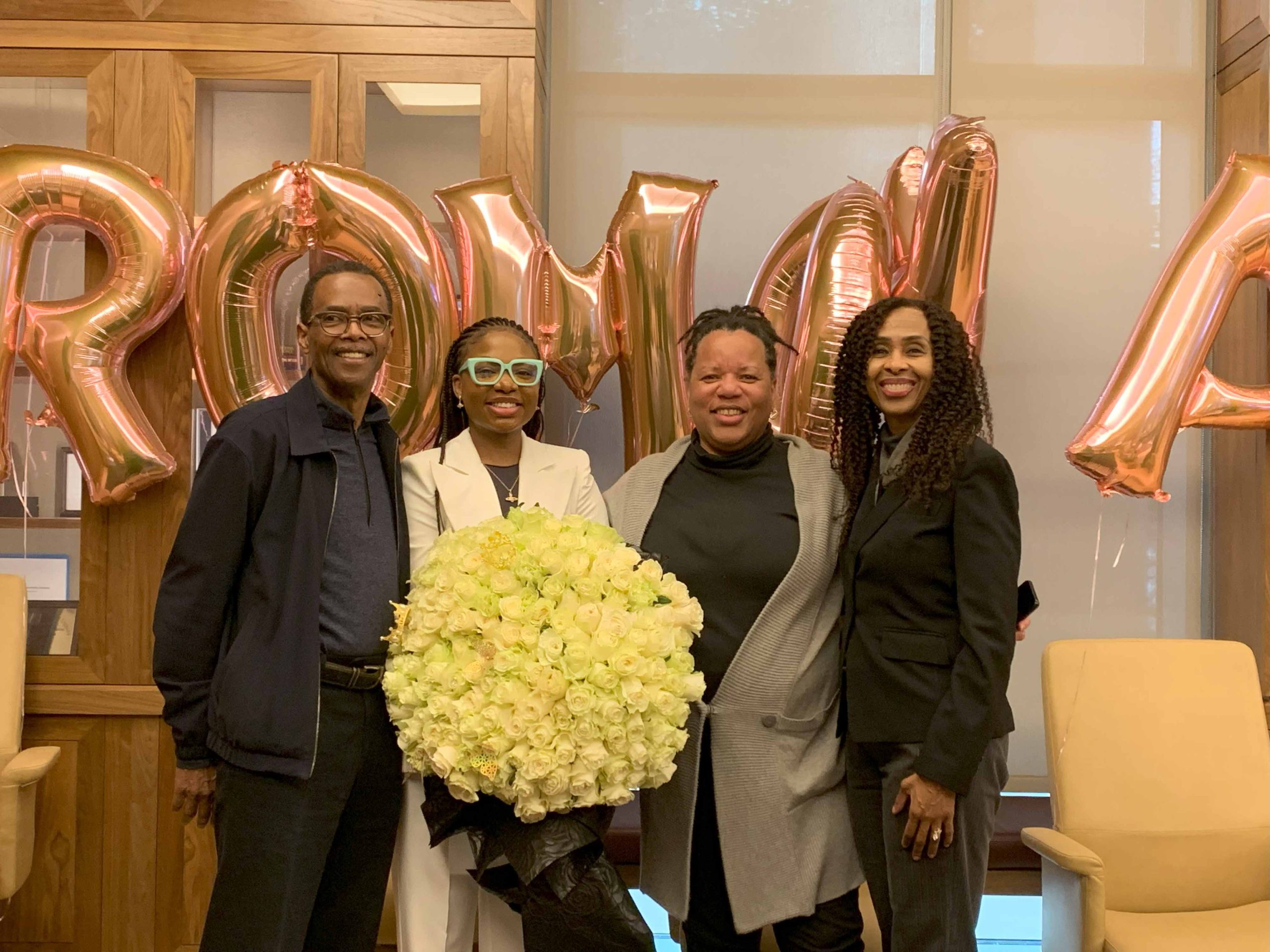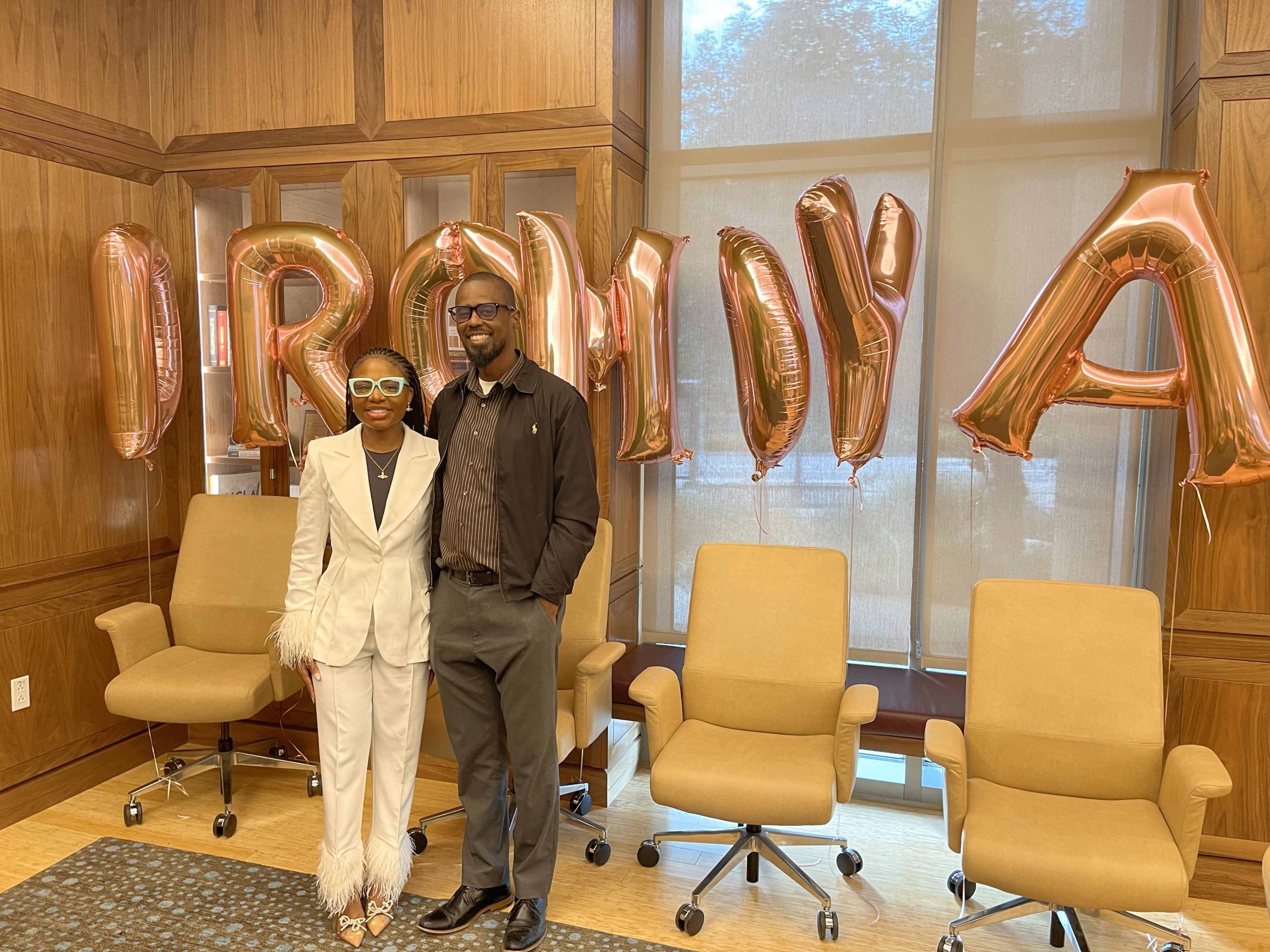Fulfilling a Family Tradition but Blazing Her Own Trail
Morolake Omoya is the first Black UCLA student to earn 3 degrees in civil and environmental engineering

UCLA Samueli
Careers in technology and science are practically a family tradition, but Rolake Omoya was the first member of her family to study outside of her native Nigeria.
Originally posted on UCLA Newsroom
If you had to describe Morolake Omoya’s UCLA journey in just two words, you might choose “risks” and “firsts.”
In March, Omoya successfully defended her doctoral dissertation, becoming the first Black student to receive bachelor’s, master’s and doctoral degrees in civil and environmental engineering from the UCLA Samueli School of Engineering.
For Omoya, who goes by Rolake (pronounced raw-lah-keh), a career in science and technology is practically a family tradition. In her native Nigeria, her father, David, is a civil engineer who consults and contracts on government projects. Omoya fondly recalls her father teaching her math and physics concepts when she was young.
Her mother, Funmilola, is a professor of microbiology at Federal University of Technology, Akure. And Morolake’s brothers — two older and one younger — have advanced degrees in engineering or computer science.
Omoya is the first member of her family to study outside of Nigeria. In 2012, she took a big risk when she moved nearly 8,000 miles away to pursue a bachelor’s degree in civil engineering at UCLA. Previously, she had left Nigeria only once before, to attend a math and science camp in Uganda, when she was 15 years old.

Audrey Pool O’Neal/UCLA
L to R: former CEED executive director Rick Ainsworth, Omoya, CEED director Catherine Douglas and Audrey Pool O’Neal at an event celebrating Omoya’s dissertation defense
“I wanted to blaze my own trail and study in the country I believed offered the best tertiary education at the time, so I applied to the top engineering and civil engineering schools in the United States,” she said. “UCLA caught my eye because of the weather, great dining hall food, promises of diversity and quality of the faculty and research.”
Her transition was not easy at the start. Her Nigerian accent and an adjustment to a different form of English from the one she learned growing up added hurdles to her academic pursuits.
“I had to repeat myself a lot and had a lot of trouble understanding my professors — processing from British to American English in real time — and I had to study much more, as I was an auditory learner,” she said.
In addition, she was pursuing a field of study in which women and Black students are significantly underrepresented. According to the American Society for Engineering Education, women earned just one-fourth of the 12,402 engineering doctoral degrees awarded nationally in 2021, and people who are Black or African American earned less than 4%.
But as she prepares to receive her doctoral hood on June 18, Omoya said she hopes her achievement highlights the unique challenges Black students face.
What helped her thrive at UCLA? Add one more word to summarize her UCLA journey: “Community.”
Early on, she joined the Center for Excellence in Engineering and Diversity.
“I was immediately impressed by her abounding curiosity, intelligence, creativity, drive and love of math,” said Audrey Pool O’Neal, a UCLA adjunct associate professor of mechanical and aerospace engineering and the center’s former director of undergraduate programs. “I soon learned these gifts were rivaled only by her compassion, sense of responsibility and an overwhelming desire to help others.”
Omoya also volunteered as the social media director and data analyst for UCLA’s Women in Engineering program, better known as WE@UCLA; and she joined Black Campus Ministries, the Nigerian Student Association, National Society of Black Engineers and Alpha Kappa Alpha sorority. Not only did the activities contribute to her scholarship and professional development goals, but they enhanced her Christian faith and her appreciation for service and commitment to sisterhood.
As an undergraduate, Omoya joined the lab of Henry Burton, UCLA’s Presidential Professor of Structural Engineering, which investigates the societal and technological impacts of natural hazards, with a particular focus on earthquakes. She had found her scholarly niche.
Omaya continued as a member of Burton’s research group through her graduate studies. Her doctoral dissertation focused on a new type of model to assess earthquake damage to communities and forecast their post-disaster recovery processes.
Focusing on the 2014 Napa earthquake, Omoya’s approach uses more data — including detailed building and site information, as well as sociodemographic data — than previous models. And it incorporates a type of statistical analysis called Bayesian inferencing for more robust and real-time modeling. Ultimately, the goal was to develop a better blueprint to help communities in the immediate aftermath of an earthquake and throughout their long-term recovery.

Omoya joined Professor Henry Burton’s lab as an undergraduate; he helped celebrate her March 2023 dissertation defense.
Over the past few years, Omoya shared her findings at conferences; often, she was one of just a handful of Black presenters, another stressor she learned to conquer.
“One thing I encouraged her to do is lean into being herself, her authentic self,” Burton said. “In these presentations, and in these venues, a lot of times, as the ‘first and only,’ we want to get everything right. So if you just focus on that, you sort of lose yourself in it.
“But once you put in the work and you use your mastery of the material, you have a little bit more freedom to be yourself. And that’s something that I was really proud of with her.”
Following her doctoral defense in March, Omoya joined Moody’s Risk Management Solutions in the Bay Area. As a risk modeler, Omoya analyzes the potential effects of catastrophic wind events in North America, Europe and other regions.
But she plans to return to campus for her commencement ceremony at Pauley Pavilion. Her parents will be there, as will Burton and O’Neal.
“It’s been an incredible privilege to have a front-row seat and watch as Morolake found her voice and followed her passion — and as she continues to make her mark in the male-dominated engineering field,” said O’Neal who has led WE@UCLA since 2017. “She has decided to be the change she wants to see. And she was always available and willing to volunteer with outreach activities to help others from underrepresented groups aspiring to become engineers and computer scientists.”
In the acknowledgment section of Omoya’s doctoral dissertation, she expresses gratitude to family, faculty, friends and her larger community. And she thanks her colleagues from WE@UCLA, the Center for Excellence in Engineering and Diversity and the National Society of Black Engineers for instilling in her that, “We rise by lifting others and others are lifted because we rise. This degree (and the two degrees prior) would mean way less without this profound lesson.”
